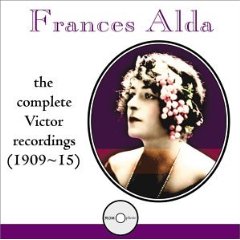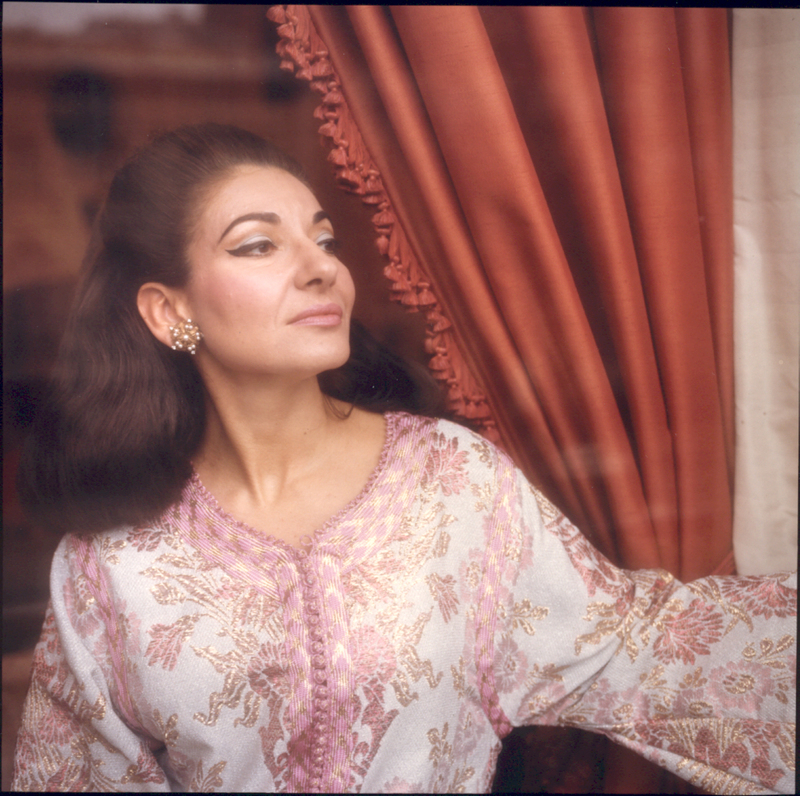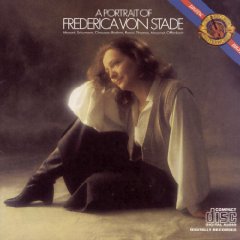As I mentioned yesterday, I’m taking the rest of the week off from blogging (though not from work!). In lieu of new postings, I’ve exhumed a couple of uncollected and long-forgotten pieces from my archives, both of them originally published in Opera News. This one is an essay called “Does Beauty Matter?” that ran in 1998. I gather it irked some people back then, and no doubt it will do the same thing now.
* * *
 Leafing through the first two volumes of Michael Scott’s The Record of Singing the other day, I was struck by the comparatively low incidence of pretty faces among golden-age singers. Most of the attractive women singers from the first part of the twentieth century turn out to have been vocally undistinguished (anybody here remember Zélie de Lussan?), and judging by the photographs in Scott’s book, the only major female singers of the period whom I would describe as great beauties were Frances Alda and Julia Culp. As for the men, not many of the indisputably great male singers of the past would have won any blue ribbons for looks.
Leafing through the first two volumes of Michael Scott’s The Record of Singing the other day, I was struck by the comparatively low incidence of pretty faces among golden-age singers. Most of the attractive women singers from the first part of the twentieth century turn out to have been vocally undistinguished (anybody here remember Zélie de Lussan?), and judging by the photographs in Scott’s book, the only major female singers of the period whom I would describe as great beauties were Frances Alda and Julia Culp. As for the men, not many of the indisputably great male singers of the past would have won any blue ribbons for looks.
It’s hard to pinpoint when this started to change. No doubt the rise of Elisabeth Schwarzkopf had something to do with it, as did the shrinking of Maria Callas. But change it most definitely did. When I think of the women singers of the past quarter-century whom I most admire, I’m more than a little surprised by how good-looking so many of them are. I think this points to a larger shift in operatic priorities: though contemporary audiences are still willing to look the other way for the sake of a really big voice, they now seem more inclined than ever before to expect major-house singers to meet at least minimal standards of pulchritude.
 What’s going on here? Several factors are at work, one of which is the extent to which the classical-music business has lately become media-driven. A soprano I know tells me that a record-company executive recently informed a very successful singer that he wouldn’t think of signing her to a contract, not because there was anything wrong with her singing but because she was too ugly to promote. I don’t know whether this story is true, but I’ve certainly noticed that the vast majority of young singers with recital discs are decidedly attractive, or have been made to seem so by their photographs.
What’s going on here? Several factors are at work, one of which is the extent to which the classical-music business has lately become media-driven. A soprano I know tells me that a record-company executive recently informed a very successful singer that he wouldn’t think of signing her to a contract, not because there was anything wrong with her singing but because she was too ugly to promote. I don’t know whether this story is true, but I’ve certainly noticed that the vast majority of young singers with recital discs are decidedly attractive, or have been made to seem so by their photographs.
More important, I suspect, is the great emphasis now placed on theatrical values by opera companies. Time was when you could get away with murder in this area, but contemporary audiences expect opera productions to be dramatically plausible as well as musically satisfying, in large part because of the now-common use of projected titles. Especially at the Met, whose productions of popular operas tend to be ultra-realistic, it’s become a risky proposition to send a 300-pound soprano thundering onto the set of Madama Butterfly, not least because everybody in the house will be reminded by Met Titles that she’s supposed to be fifteen.
You don’t have to be a feminist to wonder if this change is entirely for the better. I’m all for opera as drama, but I’m also for opera as music. Given the choice between an opera that is badly sung and brilliantly staged or the converse, I’ll almost always take the latter. What interests me more is a subtler issue: to what extent is a singer’s appearance a legitimate factor in casting a role? Should we care whether singers are beautiful? Can we even help it?
These questions do not lend themselves to simple answers. Librettists frequently stack the deck: when Radamès sings “Celeste Aida, forma divina,” he doesn’t mean maybe. Composers are more likely to be practical about such things, but even they sometimes yearn for the impossible. Though Richard Strauss knew perfectly well that his Salome is difficult for a slender young woman to sing successfully, that didn’t stop him from trying to finagle Elisabeth Schumann into taking it on, swearing that he’d transpose and rescore her music, personally conduct the production, and hold the orchestra down. Fortunately for Schumann, she knew her first Salome would also be her last, and she declined with thanks.
To be sure, the stage is a great deceiver. Veteran balletomanes know that some of the most beautiful ballerinas are not so good-looking at close range, and I know a number of singers who are no less adept at acting pretty, especially in large houses. But in most cases, the line separating beauty and its absence is clear indeed, and–reluctant though I am to say it–there are times when the presence of uncomplicated physical beauty makes all the difference. When Renée Fleming sings Desdemona, something happens onstage that simply wouldn’t happen were she plain. The fact that she is not only a first-rate singer but very attractive is part and parcel of the total experience of seeing her perform, and it should be treasured, not held in high-minded contempt.
 I hope opera buffs never become so obsessed with such matters as to forget the eternal verities of bel canto, but only a fool would pretend that human nature can be changed by fiat. The mere existence of such creatures as Susan Graham and Frederica von Stade is a salutary reminder that life is unfair. Besides, if the militant egalitarians among us were to contrive to require opera houses to conduct blind auditions, the next step would surely be for some tone-deaf, ideology-crazed judge to rule that merely because you can’t squeeze out a high C is no reason why an opera house shouldn’t be forced to cast you as Aida.
I hope opera buffs never become so obsessed with such matters as to forget the eternal verities of bel canto, but only a fool would pretend that human nature can be changed by fiat. The mere existence of such creatures as Susan Graham and Frederica von Stade is a salutary reminder that life is unfair. Besides, if the militant egalitarians among us were to contrive to require opera houses to conduct blind auditions, the next step would surely be for some tone-deaf, ideology-crazed judge to rule that merely because you can’t squeeze out a high C is no reason why an opera house shouldn’t be forced to cast you as Aida.
Better, then, to accept the inevitable, and to be comforted by the thought that nobody ever called Kirsten Flagstad a megababe. In opera, looks aren’t everything. Sometimes they aren’t even anything.
